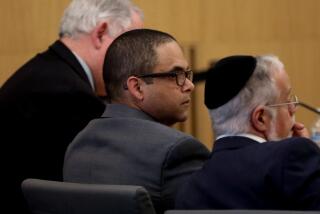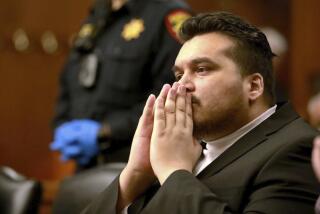Jury deadlocks in trial involving fatal stabbing of Job Corps advisor
- Share via
No one disputed that Freddy Leyva stabbed his Job Corps advisor to death.
The question was why.
Prosecutors said the March 2012 slaying of Dwayne Alexander, a respected former entertainment industry executive described as a gentle soul, was first-degree murder — the act of a racist, homophobic deviant capable of slashing a man almost 30 times.
But Leyva’s attorney, Tomas Requejo, contended that his client was a troubled young man who had suffered sexual abuse by Alexander, 49. The crime, Requejo said, was voluntary manslaughter, not murder.
After deliberating for almost four days, the jury couldn’t decide which side was right.
On Friday, jurors returned to the downtown Los Angeles courtroom where they had heard about two weeks of testimony and declared they couldn’t reach a unanimous verdict. Superior Court Judge Craig Mitchell thanked them for their service and declared a mistrial.
In the end, 10 jurors believed the crime was murder, while two were swayed by the defense’s argument that Leyva had instead committed manslaughter.
One juror, who did not want to be identified, described the deliberation process as “really intense.”
“I’m still kind of shaky,” she said.
She said that a particular sticking point seemed to be the disconnect “between what [Leyva] believed happened and what actually happened,” in regard to his allegation of sexual abuse.
Members of Leyva’s family who were in court Friday declined to speak with a reporter, though his mother, smiling, said she was “happy.”
Deputy Dist. Atty. Robert Britton said that “based on the evidence, my office believes it’s a first-degree murder case.” He said his office will seek to retry Leyva.
Britton contended that the abuse allegations were a last-ditch attempt by the defense to obscure a clear-cut case. In closing arguments Monday, he said Leyva had told his roommate that he disliked African Americans and people who were gay, which he believed Alexander was.
On the afternoon of March 14 last year, Leyva took a drywall knife into Alexander’s office at the Hollywood Job Corps dorm where Leyva lived and slashed the 6-foot-3 program advisor 29 times, prosecutors said.
When police arrived on scene, they found three fellow students holding Leyva down, as Alexander bled on the office floor, according to reports from the time. Alexander had been sitting at his desk when he was attacked, Britton said.
As Leyva went through the booking process, Britton said the defendant told an officer that the blood on his hands made him aroused.
“I’m a man now,” the officer testified hearing Leyva say.
Reached by phone Friday afternoon, Requejo said he was surprised by the trial’s outcome.
“This is a case that should’ve been resolved from the very get-go,” he said. But investigators and the district attorney’s office “wanted to have shutters over their eyes about the abuse of Freddy.”
During his closing arguments, Requejo said his client had been doing well in Job Corps — a U.S. Department of Labor program that gives low-income youths career training — and had hoped to become an electrician.
“Issues didn’t arise,” Requejo said, until Leyva moved into the Hollywood dorm. Over the course of the months before Alexander’s death, he said, the advisor had made unwanted sexual advances on Leyva with increasing aggressiveness.
In stabbing Alexander, Requejo said, Leyva had acted in “imperfect self-defense,” meaning he honestly, but unreasonably believed that he was in danger of great injury or death, and needed to defend himself.
“It was him or me,” Leyva told a detective investigating the stabbing, according to Requejo. When the detective asked if Leyva truly believed Alexander intended to hurt him, Requejo said, Leyva responded: “He’s been hurting me.”
Requejo criticized the detective for never following up on that claim.
Leyva and his brother testified that they had been abused as children, which Requejo said made Leyva’s fear that Alexander would rape him reasonable, even if that logic was confined to Leyva’s own thinking.
“Was he really fearful?” Requejo said. “If you take into consideration his history, it makes sense.”
Britton had dismissed the defense’s position, calling it “as ridiculous as it is offensive.”
Alexander’s mother, Everlean Wilson of Tulsa, Okla., agreed, saying it was clear to her that the defense didn’t “have a leg to stand on.” Nonetheless, she said, Leyva’s testimony about her son was “real difficult” to sit through.
More to Read
Sign up for Essential California
The most important California stories and recommendations in your inbox every morning.
You may occasionally receive promotional content from the Los Angeles Times.









